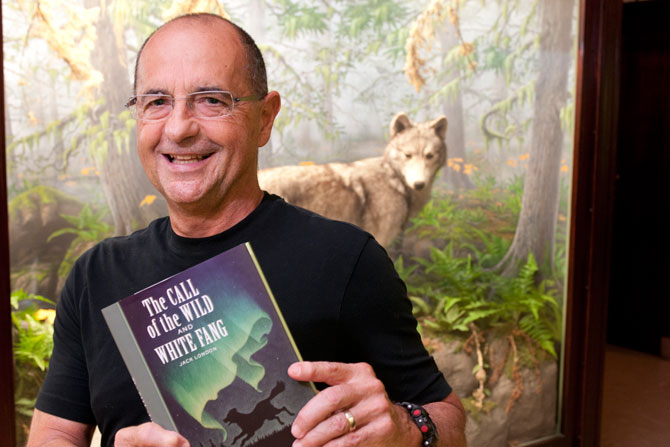Even when he wasn't working the 3 p.m. to midnight shift as the editor of the Daily Iowan, Brian Stewart* couldn't escape the newsroom atmosphere. For relaxation this summer, the journalism and mass communication senior picked up The Imperfectionists, Tom Rachman's acclaimed debut novel about an English-language newspaper in Rome.
Who doesn't love to pick up a book and become immersed in a great story? What about people who work with words every day, though? What do they read to relax? Iowa Alumni Magazine asked around the UI community to discover what appeared on personal reading lists this summer.
"Rachman, a Columbia journalism graduate who has worked for the Associated Press and edited at the International Herald Tribune, offers a quirky cast," says Stewart. "As the book title suggests, these people are also imperfect. The editor-in-chief discovers that her husband is having an affair, which she finds oddly beneficial; the obituary editor struggles to cope with a loved one's death; and the corrections editor fights copy inaccuracies like Germany experiencing 'a genital malaise in the economy.'
"Even non-journalists will enjoy Rachman's work, which melds wit and romance. His characters are charming and believable, although they tend to be boilerplate journalist-types, and he brings them to life with vivid detail he likely mastered as a reporter. Their vignettes are interspersed with brief chapters that recount the history of the publication and also grapple with issues dotting today's media landscape.
"The book is a quick read—easy to set down and pick up again a few days later. And, after long days in the Daily Iowan newsroom, The Imperfectionists gave me a chance to laugh at some of the absurdities of the industry."

Natural Inspiration
As she explored her new hometown this summer, Jeanette Pilak, executive director of the new Iowa City UNESCO City of Literature organization (www.iowacityofliterature.org), revisited an old literary friend. Inspired by a Bill Moyers television show about Barry Lopez, she decided to read every book by the award-winning nature writer.
"Listening to that last show of Moyers' Journal in April, I realized what a huge impact Lopez's writing has had on my life, particularly the years I spent in Oregon where he now makes his home," she says. "This summer, I started with Lopez's collection of essays, About This Life: Journeys on the Threshold of Memory, which has been called a 'travelogue of journeys both inward and outward.' Since I first read this book in 1999, I'm certain I've recommended it to others at least once a month. The combination of Lopez's writing style and his precise observations illuminating the topics of nature and man's interactions with nature captures my mind and my heart.
"Certainly, I cannot take a road trip without recalling his essay 'Apologia,' where Lopez describes in eloquent detail the results of the collisions between motor vehicles and wildlife. On a cross-country drive he stops each time he finds roadkill, taking time to bury it, or move it off the highway.
"His acts of deliberate grace awaken in me a deeper consciousness of all living creatures and drive me to contemplate how mankind interacts with other species."

Wild at Heart
Each semester, eager students rush to fill classes offered by Jewish Studies professor Jay Holstein from the College of Liberal Arts and Sciences' Department of Religious Studies. This summer, the instructor of the legendary "Quest for Human Destiny" offered a new thoughtprovoking course that draws on two of his favorite books.
"I will mostly remember this summer because of the introduction of a new puppy into our home and the teaching of a new course on the Bible and the suffering of animals," says Holstein. "Integrating this wonderful animal into our home and preparing the course took me back to Jack London's The Call of the Wild and White Fang. I had not read these books for almost five decades, but they have never been altogether forgotten because of the great animals—Buck and White Fang—at the heart of both stories.
"Both Buck and White Fang display the virtues that open the human heart to pets: uncompromising loyalty, a delight in the simple pleasures, and what can only be called nobility in the face of the pains that life sometimes doles out. In my 40 years here at the UI, the vast majority of my students have cherished their pets.
"White Fang's transition from the wild to civilization is much more difficult than Buck's transition to the wild, and the reason is unfortunately simple: Buck and White Fang run afoul of malicious human beings who are able to torment them only because of superior technology.
When Buck and White Fang are fortunate enough to be cared for by good human beings, the reader sees that goodness can redeem life from shame. When Jack London describes White Fang's misery as a wolf cub, separated from his mother and in the hands of a cruel human, how can we not grieve?
"Perhaps how we treat the helpless, be they human or animal, is the best guide to the quality of our life."

Adrift in Words
Holly Carver, director of the UI Press—"Where Great Writing Begins"—knows what makes great reading. So does David Rhodes, 71MFA, author of Driftless. In his first published work since a devastating motorcycle accident more than 30 years ago, the Iowa Writers' Workshop graduate picks up the story of July Montgomery, the hero of his 1975 novel, Rock Island Line. The result, says Carver, left her impressed and engrossed—high praise, indeed.
"Driftless brilliantly delineates the lives of men and women in and around the irresistibly named town of Words, Wisconsin. In a literary equivalent to the terrain of the real-world Wisconsin's Driftless Area (so named because it escaped glacial drifts during the last Ice Age), Rhodes' characters meander into blind valleys, sinkholes, disappearing streams, cold springs, and caves while trying to navigate through their lives.
"They deal with love, loss, treachery, religious epiphanies, and family reunions—the everyday stuff and miracles of life. The book has a vignette-like pace that seems disjointed at first but then becomes smoothly mesmerizing. At first, I thought I'd never keep track of all these people, but by the end of the book I was totally captivated by them all. Rhodes creates pairs of characters who re-enact classic polar binaries: love/hate, fear/ courage, faith/logic, good/evil, and trust/paranoia. He expertly reveals the inner thoughts of his characters to show the riches that can exist beneath even a fairly bland or faintly evil exterior.
"I love a happy ending, and if I'm worried about the outcome of a book, I have no qualms about checking the last page at any time during my reading. While I cared a lot about these characters, though, I trusted Rhodes so much that I didn't have to check the ending. Well, not more than once, anyway."

A Tiger by the Tale
David Perlmutter, director of the UI School of Journalism and Mass Communication, put Nevin Martell's Looking for Calvin and Hobbes: The Unconventional Story of Bill Watterson and His Revolutionary Comic Strip at the top of his summer reading list.
"Bill Watterson, the creator of the Calvin and Hobbes comic strip about a little boy and his toy tiger, is a cultural hero of mine. I am a proud owner of The Complete Calvin and Hobbes, reputedly the heaviest books to make the New York Times bestseller list," he says.
"Martell's book is not really a biography because the main subject completely eluded him—that is, refused to speak to him, as he has for most appearance and interview requests for almost a decade. But I was able to pick up several interesting insights: Watterson's high school mascot was, you guessed it, a tiger; little blond Calvin first appeared in another, failed, strip by Watterson.
"Most of all, I garnered some rich context and discussion of how and why Watterson challenged the three unfortunate premises of modern pop culture. First, he never sold out his art through mass merchandising. He only allowed one T-shirt licensing, to the Smithsonian for an exhibit, and he did not return Steven Spielberg's calls to talk about a movie deal. Second, he argued against the "zombification" of cartoon strips whose creators died, retired, or ran out of jokes long ago, but that are kept alive by hired staffs just to squeeze out maximum profit.
"Finally, Watterson has lived his life during and post-Calvin and Hobbes as a complete rejection of our worship of celebrity for celebrity's sake. He not only refused to exploit his own work, he refused to exploit himself via the lecture circuit or paid interviews. Would that we had more artists, politicians, and other so-called 'personalities' who followed his lead."

